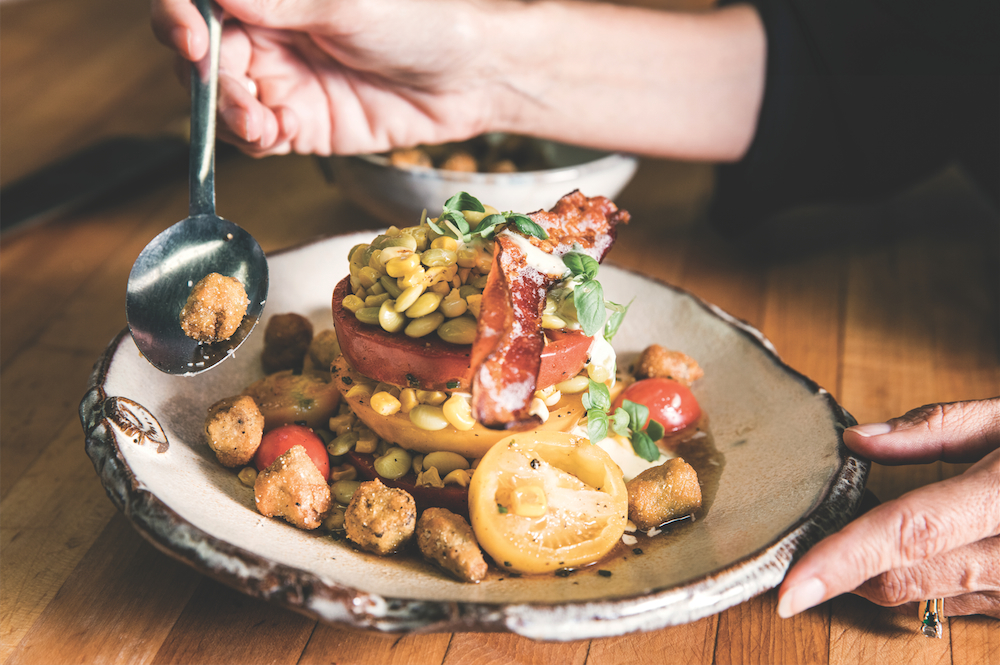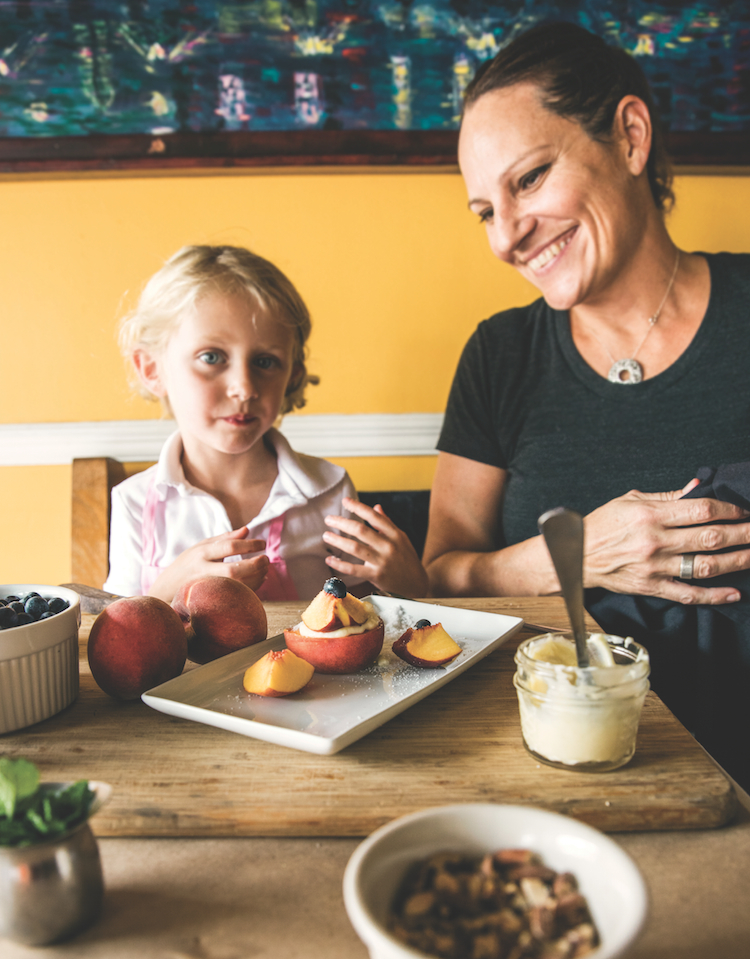Three Arts and Sciences alumni have built landmark brands—and enviable reputations—as trailblazers in Birmingham’s food and beverage scene.
By Cary Norton
Eric Meyer of Cahaba Brewing. Idie Hastings of Hot & Hot Fish Club. Maureen Holt of Little Savannah. They come from different eras of UAB’s history, and they majored in different subjects, but they’ve all become leaders in Birmingham’s burgeoning, nationally acclaimed food and beverage scene.
What impact did UAB have on their careers? What relationships, courses, and experiences shaped their success? And how do their roles as leaders in the community impact today’s arts and sciences students?
Read about their journeys from undergraduates to entrepreneurs, and raise a glass (or fork) to their accomplishments.
Eric Meyer
Cahaba BrewingIndividually Designed Major, 2001
 Perhaps, in hindsight, it’s not surprising that Eric Meyer graduated with an individually designed major. After all, this is the guy who, along with his partners, built one of the area’s most successful breweries from his homebrew setup. The guy who is also a fulltime fireman in Mountain Brook. The guy who is embarking on a project to restore one of the city’s most rambling and historic properties. But let’s back up.
Perhaps, in hindsight, it’s not surprising that Eric Meyer graduated with an individually designed major. After all, this is the guy who, along with his partners, built one of the area’s most successful breweries from his homebrew setup. The guy who is also a fulltime fireman in Mountain Brook. The guy who is embarking on a project to restore one of the city’s most rambling and historic properties. But let’s back up.Meyer, a Huntsville native, came to UAB with dreams of medical school. But like many others with the same goal, he discovered that was not his path. “I liked science, but I gravitated toward natural history and botany,” he explains. He also was curious about the relatively new field of geographic information systems (GIS). By his junior year, this cobbled-together plan began to take shape, and his advisors pushed him along the unusual path, letting him pick the courses that fit while ensuring he met his degree requirements.
As a student, Meyer had interned with the Jefferson County Storm Water Management Authority. “In the summer of 2000, we mapped the entire Cahaba River with GPS,” he says. “We walked, then floated, from Springville all the way down and mapped everything that wasn’t natural.”
That internship led to GIS-work with the county after graduation. And Meyer’s interest in science had expanded to healthcare, which in turn led him to take Emergency Management Technician classes at UAB. “I was a fulltime fireman in Graysville for a year, and then I moved to the Mountain Brook Fire Department in 2003. I work 10 days a month, 24 hours on the days I’m there. It’s intense, but the schedule allows me to also focus on growing the brewery.”
At Cahaba, Meyer shares responsibilities with four other partners. He’s the managing partner and brew master, but as the company has taken off, he’s delegated some of his hands-on responsibilities to a growing staff. “I used to brew and do all the books, but now we’re bringing other people on so I can focus on growing the company in the right way.”
Looking back, Meyer can see patterns in both his educational and personal interests. “With my science background, and all those labs in college, I learned to research, test, and come to a conclusion,” he explains. “That has definitely influenced the way I make beer, first at home and now at Cahaba. Our goal is to produce a clean and consistent product.”
His UAB friendships were also instrumental in his success. “Back in 2010, I inherited a little money from my grandfather’s estate,” he says. “I went to some of my fraternity brothers and brokered a handshake deal, $100 and they could buy in.” Today, as Meyer and his partners embark on their biggest project yet—the restoration of the old Cottondale Gin in Avondale as the future home of Cahaba Brewing— he says the future is bright, for him, his business and the city.
“I have three healthy children, a wife who still loves me and two careers that I love,” he says. “I have absolutely no complaints about how my life turned out.”

Idie Hastings
Hot & Hot Fish Club and Oven Bird restaurantsCriminal Justice/Psychology, 1986
 Like many of her fellow students in the mid-1980s, Idie Hastings chose UAB because its flexible class schedule ensured that she could work as a legal secretary and still graduate in only five years. “UAB allowed me to take classes in the early morning, in the evenings, and on weekends,” she says. “I felt like they really catered to people holding fulltime jobs.”
Like many of her fellow students in the mid-1980s, Idie Hastings chose UAB because its flexible class schedule ensured that she could work as a legal secretary and still graduate in only five years. “UAB allowed me to take classes in the early morning, in the evenings, and on weekends,” she says. “I felt like they really catered to people holding fulltime jobs.”Majoring in Criminal Justice/Psychology (then in the School of Social and Behavioral Sciences), Hastings was drawn to her area of study because she liked observing people. She’d always been told she was a good listener, and she considered a career in forensic psychology or in counseling abused children and the elderly. And her work at the law firm fueled her interest in law, civil liberties, justice, and people’s decision-making tendencies.
But it was her talent in the kitchen—throwing dinner parties with her college roommates—that set her on her career path. “We liked to do it, and it was a form of relaxation for me to cook,” Hastings says. “After graduation, I was deciding if I should try for my masters or go to culinary school. When I found a culinary school in San Francisco, I made a major decision to change my life completely.”
While her career may not have an obvious connection to her undergraduate major, Hastings says there are benefits to what she studied, even in the food business. “Both criminal justice and psychology can be of benefit when you work with a variety of people daily, especially when your job is based in customer service,” she says. “My psychology classes taught me to observe and listen to people. And my college experience taught me time management skills and perseverance. You learn how to start and finish your work, solve problems, and execute your goals.”
Along with her husband Chris, Idie has built an award-winning restaurant in Hot & Hot Fish Club. The landmark eatery is a frequent finalist in the prestigious James Beard Awards and other competitions. Hastings and her husband are soon to open a new venture—Oven Bird—in Birmingham’s Pepper Place. “Everything on the menu will be cooked over an open fire,” she says.
As for the food and beverage scene in Birmingham, Hastings says that it continues to grow and “sprout new ideas that will [continue to] make Birmingham an eclectic place to live,” she says. “In five years, I wouldn’t be surprised to see the circuit from Downtown, Railroad Park, Pepper Place and Avondale connect to make a viable, progressive marketplace with independent entrepreneurs.”

Maureen Holt
Little Savannah restaurantPsychology, 1992
 Maureen Holt had practical reasons for transferring from Birmingham-Southern College to UAB, and she has retained a practical view about work and education since she graduated with a major in psychology and a minor in French. “I’m from a big family and I have two brothers with Down syndrome, and I needed to be there on the weekend to help my mother,” Holt says. “I worked fulltime waiting tables, bartending, even doing some management, and I would pay my mom back at the end of each semester. That flexibility with classes was so important for me.”
Maureen Holt had practical reasons for transferring from Birmingham-Southern College to UAB, and she has retained a practical view about work and education since she graduated with a major in psychology and a minor in French. “I’m from a big family and I have two brothers with Down syndrome, and I needed to be there on the weekend to help my mother,” Holt says. “I worked fulltime waiting tables, bartending, even doing some management, and I would pay my mom back at the end of each semester. That flexibility with classes was so important for me.”She chose psychology with an eye on a career in physical therapy, an interest that stemmed from her brothers, and thought that UAB would give her a path to physical therapy school. But as she worked in restaurants around the city to help pay her tuition, she discovered a love for the food business. When graduation came, “I wasn’t mentally prepared to continue with school then,” she says. “I had a lot of job offers from restaurants in town, so that’s what I decided to do.”
Holt worked in a number of well-known Birmingham restaurants, from her first job at Mauby’s at age 15 to working side-by-side with her sister at PT’s. She met her husband Clif when she was the maître d at Bottega’s main dining room and he was a chef at Highlands Bar and Grill. The couple married in 2002 and the next year they opened Little Savannah, now a Forest Park landmark. Daughter Jamie Jean, who just started kindergarten, is also a point of pride. “She’s grown up in the kitchen,” Holt says.
Thirteen years after opening Little Savannah, the Holts have built a reputation as an efficient team with a creative flair and a dedication to locally sourced ingredients. They’ve also been leaders in the local food community, always looking for ways to grow not only their own business but help develop culinary talent in others.
“I went through culinary school to learn that curriculum, but also so I could learn to teach others,” Holt says. “I started teaching our cooking classes here at Little Savannah and I’ve loved it. We’ve also had some incredible chefs come through our restaurant and it’s been wonderful to see them spawn new ideas and open new restaurants of their own.”
“But the problem I’m seeing is that there aren’t enough trained people in the city to staff all of these new restaurants that are opening,” she continues. “The food scene in Birmingham has grown so quickly, we’re all struggling to catch up with trained staff.”
To that end, Holt has ideas on ways to provide students with a fast track, six-month culinary program that would expedite the training process. She’s also working with Jones Valley Teaching Farm to allow high school students to come to the restaurant after school and learn some front- and back-of-house skills.
Always practically minded, Holt knows that not only local restaurants need the help, but the students will need marketable skills beyond fast food or retail jobs. “When I was in school, my teachers were supportive and available when I needed them.”
Which sounds a lot like Holt’s own experience—proof that an investment in talented young people will always pay off.



